Erm, let’s hope they meant ‘on’, not ‘in’ their heads in this piece on Glass use in hair styling or it would get creepy…
Blog
Bias Time (5 of 9)

[Hundertwasser questioning your presumptions]
Yes, it’s bias time again. The fifth of the series of biases that you, yes you, have. (Previous one, here) Even if you are aware of these, and even if you consciously try to correct for them to be, heh, ‘objective’, as in what e.g. auditors pursue, you will fail.
Common theoretical causes of some cognitive biases
- Bounded rationality – limits on optimization and rationality
- Attribute substitution – making a complex, difficult judgement by unconsciously substituting an easier judgement
- Attribution theory, especially:
- Salience
- Cognitive dissonance, and related:
- Impression management
- Self-perception theory
- Heuristics, including:
- Availability heuristic – estimating what is more likely by what is more available in memory, which is biased toward vivid, unusual, or emotionally charged examples
- Representativeness heuristic – judging probabilities on the basis of resemblance
- Affect heuristic – basing a decision on an emotional reaction rather than a calculation of risks and benefits
- Adaptive bias
- Misinterpretations or misuse of statistics.
From the digital front, no news (?)
![Warped, intentionally [,|so] beautiful](https://maverisk.nl/wp-content/uploads/dscn6269.jpg)
[Warped, intentionally [,|so] beautiful]
Hey, has anyone noticed how silent it has been for the past couple of months (maybe six), on ‘cyber’warfare ..?
Was reminded when that phrase was so preciously avoided in this (Dutch) piece.
Apart from the caricature posturing as authority (quod non par excellence) and the depicted image of control (also, the extreme opposite of reality): Hasn’t the enormity (also, of detail as released) of Edward S.’s revelations fogged the bigger picture ..?
[Edited to add:]
This (only in Dutch, again; what small-mindedness – assuring the opponents laugh around the world and back all through NL?) ‘annual report‘ quod non seems impressive, until you realise what actual work has been done…
Book by Quote: Mintzberg’s Managing

[Or a mess, when addressed too formally]
Yet another ‘Book By Quote’ then (An attempt to subjectively summarise a book by the quotes I found worthwhile to mark, to remember. Be aware that the quotes as such, aren’t a real unbiased ‘objective’ summary; most often I heartily advise to read the book yourself..!)
So, this time: Henry Mintzberg’s Managing, Pearson Books, 2011, ISBN 9780273745624.
Bramwell Tovey of the Winnipeg Symphony Orchestra stepped off his podium to talk about the job. “The hard part,” he said, “is the rehearsal process,” not the performance. (p.5)
The more we obsess about leadership, the less we seem to get. (p.9)
After years of seeking Holy Grails, it is time to recognise that managing is neither a science nor a profession; it is a practice, learned primarily through experience, and rooted in context. (p.9)
But effective managing is more dependent on art, and is especially rooted in craft. (p.10)
Most of the work that can be programmed in an organization need not concern its managers directly; specialists can do it. That leaves the managers with much of the messy stuff – the intractable problems, the complicated connections. (p.10)
The Internet may be driving much management practice over the edge, making it so frenetic that it has become dysfunctional: too superficial, too disconnected, too conformist. (p.40)
… depicting management as taking place on three planes: information, people, and action, inside the unit and beyond it. (p.43)
Let me consider two possible explanations. The first is that, as in other primitive societies, we live in mortal fear of our own gods, or at least our own myths, and management/leadership is surely one of them. Perhaps we fear the consequences of revealing their nakedness, or our own. Of course, we write about “leadership,” ad nauseam, but little of that touches on the everyday realities of managing. (p.46)
A good part of the work of managing involves doing what specialists do, but in particular ways that make use of the manager’s special contacts, status, and information. (p.47)
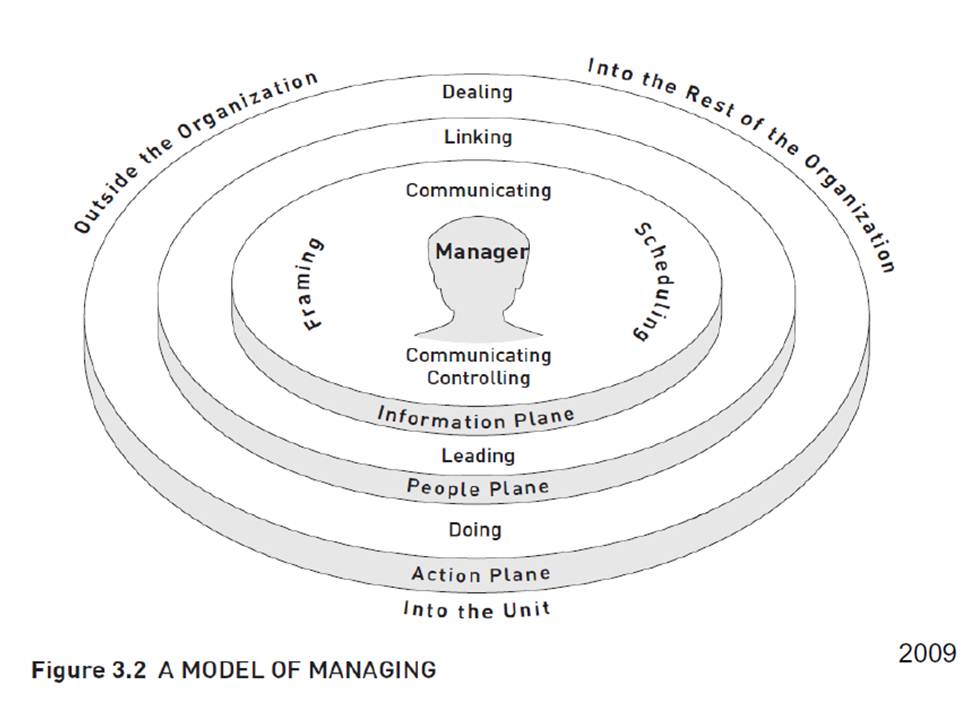
As Whitley put it, managing is “not so much focused on ‘solving’ discreet, well bounded individual problems as in dealing with a continuing series of internally related and fluid tasks”… (p.51)
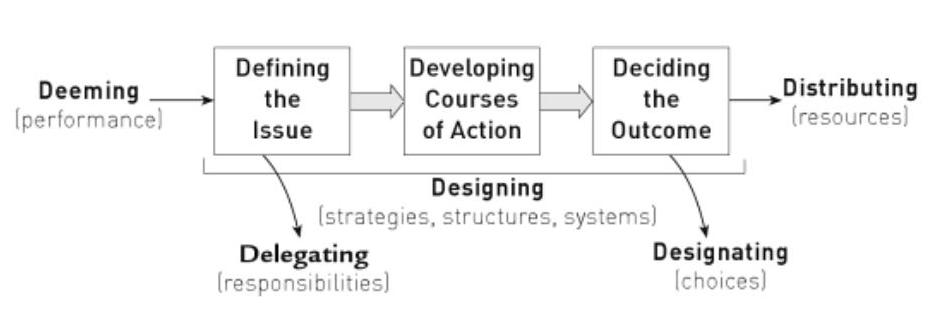
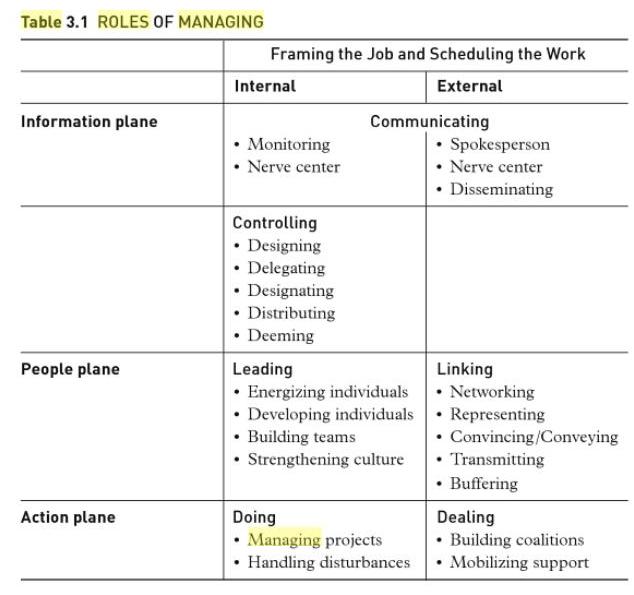
Imagine biology with no vocabulary to discuss species: how to distinguish, for example, beavers from bears without any word beyond mammal? This is the state we are in when it comes to organizations, in practice as well as in research: we have little vocabulary beyond the word organization. (p.106)
• The Entrepreneurial Organization: centralized around a single leader, who engages in considerable doing and dealing as well as strategic visioning
• The Machine Organization: formally structured, with simple repetitive operational tasks (classic bureaucracy), its managers functioning in clearly delineated hierarchies of authority and engaging in a considerable amount of controlling
• The Professional Organization: comprising professionals who do the operating work largely on their own, while the managers focus more externally, on linking and dealing, to support and protect the professionals
• The Project Organization (Adhocracy): built around project teams of experts that innovate, while the senior managers engage in linking and dealing to secure the projects, and the project managers concentrate on leading for teamwork, doing for execution, and linking to connect the different teams together
• The Missionary Organization: dominated by a strong culture, with the managers emphasizing leading to enhance and sustain that culture
• The Political Organization: dominated by conflict, with the managers sometimes having to emphasize doing and dealing in the form of firefighting (pp.106-107)
… “downsizings.” This looks to be a contemporary form of bloodletting – the cure for every corporate disease. (p.111)
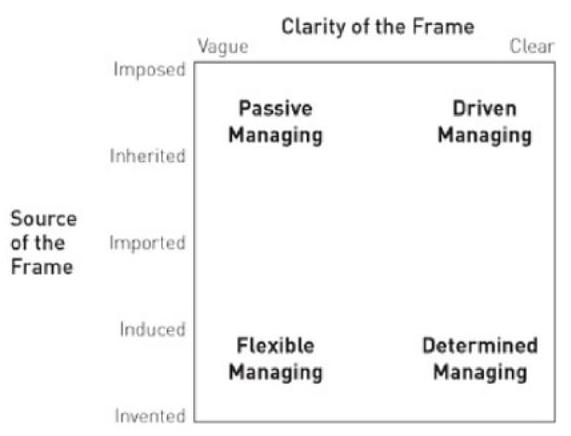
In other words, pressure in this job is business as usual – … managing is “one damn thing after another”. Brian Adams of Bombardier was not in a classical job of “managing by exception”; his was a job of the management of exceptions. (p. 116)
If one factor stood out in these days of observation, it was proactiveness : the extent to which the managers used whatever degrees of freedom available for the benefit of their units or organizations, even if that was to reinforce stability. (p.122)
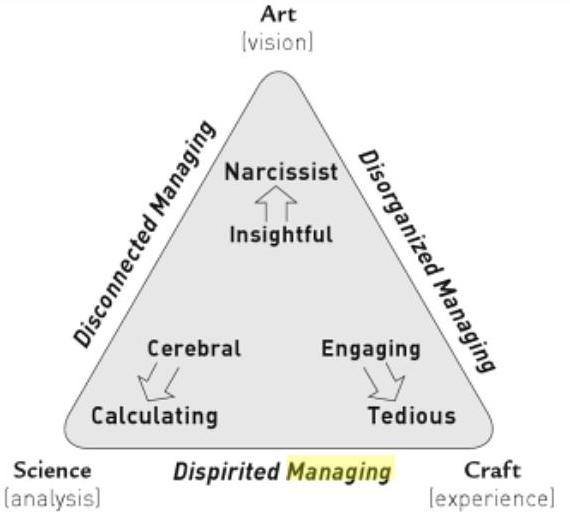
This assumption, that we can change our behaviours the way we change our golf clubs – a long-standing one in much of applied psychology and management development – needs to be scrutinized. (p.131)
The effective manager may more usually be the one whose natural style fits the context, rather than the one who changes style to fit context, or context to fit style (let alone being a so-called professional manager whose style is supposed to fit all contexts). (p.132)

If such questions could be resolved simply, they would go away. They remain because they are rooted in a set of conundrums that are basic to managing – concerns that cannot be resolved. In the words of Chester Barnard: “It is precisely the function of the executive … to reconcile conflicting forces, instincts, interests, conditions, positions and ideals”(1938:21). Notice his use of the word reconcile, not resolve. (p.158)
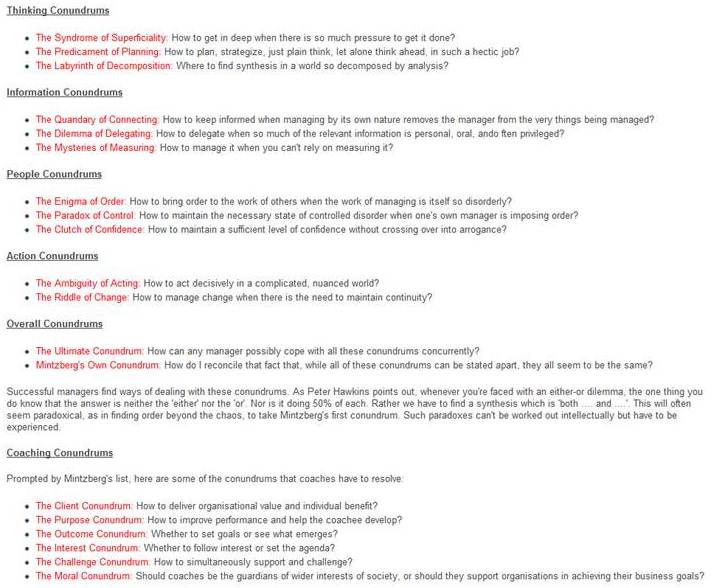
Hence … the job of managing does not develop reflective planners; rather it breeds adaptive information manipulators who prefer a stimulus-response milieu. (Mintzberg 1973:5) (p.160)
Given the dynamic nature of their job, managers have to find time to step back and out; this has to become intrinsic to their work. Reflection without action may be passive, but action without reflection is thoughtless. (p.160)
When Michael Porter wrote in The Economist that “I favour a set of analytic techniques to develop strategy” (1987), he was dead wrong: Nobody ever developed a strategy through a technique. (p.162)
Strategies are not tablets carved atop mountains, to be carried down for execution; they are learned on the ground by anyone who has the experience and capacity to see the general beyond the specifics. Remaining in the stratosphere of the conceptual is no better than having one’s feet firmly planted in concrete. (p.163)
Structure is supposed to take care of organization, just as planning is supposed to take care of strategy. Anyone who believes this should find a job as a hermit. (p.164)
Nothing is more dangerous in an organization than a manager with little to do. (p.165)
Common these days is what can be called the administrative gap. … A gaping hole exists between those who administer and those who deliver the basic services. (p. 171)
“Top management’s insistence [at a teleconference “far removed from the world of murky technology, shims, improvisation, and tacit understanding that engineers used to make the shuttle fly”] on explicit argument as a substitute for their own lack of firsthand experience silenced te tacit reservations that foreshadowed tragedy”(Weick 1997:395) (p.173)
It has become a popular adage that if you can’t measure it, you can’t manage it. That’s strange, because who has ever really measured the performance of management itself? I guess this means that management can not be managed. … Apparently we have to get rid of both management and measurement – thanks to measurement. (p.176)
1. Hard data are limited in scope. They may provide the basis for description, but often not for explanation. (p.177)
2. Hard data are often excessively aggregated. … It’s fine to see the forest from the trees – unless you’re in the lumber business. Most managers are in the lumber business: they need to know about the trees, too. Too much management takes place as from a helicopter, where the trees look like a green carpet. (p.177)
… we have to cease being mesmerized by the numbers and stop letting the hard information drive out the soft, instead combining both whenever possible. (pp.178-179)
As Tom Peters put it, in managerial work “’sloppiness’ is normal, probably inevitable, and usually sensible” (1979:171) (p. 180)
The organization may need predictability, but the world has this nasty habit of sometimes becoming unpredictable: … (p. 180)
Hierarchies work in both directions, so what is sent down has a habit of coming back up, and when a manager imposes a nice neat plan and gets back nice neat reports – on how nicely and neatly the plan was supposedly executed. (p.181)
In other words, managers often have to feign confidence. For reasonably modest managers, this can be difficult enough; for the supremenly confident, it may not be difficult at all, just catastrophic. (p.186)
If you are sure of the facts and are positive of the right corrective action to be taken, if you endorse any single answer, you’re dead. (Pascale and Athos, p.188)
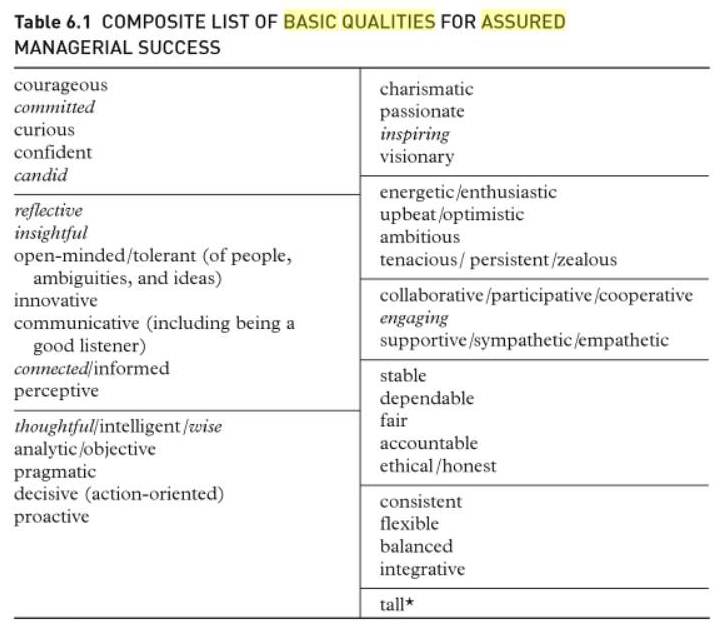
… succesful managers are flawed – we are all flawed – but their particular flawsare not fatal, at least under the circumstances. (p.197)
Fatally flawed are those superman lists of managerial qualities, because they are utopian. (p.198)

That is why the terms “calculated chaos” and “controlled disorder” apply so well to managerial work. (p.210)
To appreciate other people’s worlds does not mean to invade their privacy or to “mind-read” them, which can be condescending. Lewis et al. found these to be “destructive characteristics” seen only in “the most severely dysfunctional families” (p.213). (p.213)
Hiro Itami …told the participating managers: “Management is not to control people. Rather it is to let them cooperate.” (p.213)
Collaboration is not about “motivating” or “empowering” people in the unit, because as noted earlier that may just reinforce the manager’s authority. It is rather in helping them, and others outside the unit, work together … (p. 214)
Managing seems to work especially weel when it helps to bring out the energy that exists naturally within people. It is important to appreciate that there is nothing especially magical about this thread, no great characteristic of leadership. (p.214)
Mary Parker Follett wrote in 1920 that “the test of a foreman is not how good he is at bossing, but how little bossing he has to do.” (p.215)
Managers who try to go it alone typically end up overcontrolling — issuing orders and deeming performance in the hope that authority will ensure compliance. (p.215)
To quote Isaac Bashevis Singer in what could be a motto for the effective manager: “We have to believe in free will; we’ve got no choice.” (p.216)
Effective managers thus do not act like victims. They are “agents of change,” not “targets of change”. (p.216)
Managing is a tapestry woven of the threads of reflection, analysis, worldliness, collaboration, and proactiveness, all f it infused with personal energy and bounded by social integration. (p.217)
Managers should be selected for their flaws as much as for their qualities. (p.219)
Managing happens on the inside, within the unit (with the roles of controlling, leading, doing, and communicating), and on the outside, beyond the unit (through the roles of linking, dealing, and communicating). Yet it is usually people outside the unit who control the selection of its manager … What sense does this make, especially when it is so much easier to impress outsiders, who have not had to live with the candidates on a daily basis? Charm may be one criterion for selection, but hardly the main one. (p.220)
If one simple prescription could improve the effectiveness of managing monumentally, it is giving voice in the selection processes to those people who know the candidates best – namely, the one who have been managed by them. (p.220)
There seems to be some tendency of late, at least for senior positions, to favor outsiders: the new broom that can sweep clean. Unfortunately, the sweeping may be done by the devil the selection committee does not know, while the sweeper may not know enough to distinguish the real dirt. So the danger arises, especially in this age of heroic leadership, that the new broom will sweep out the heart and soul of the enterprise. (p.221)
Managers are not effective, Matches are effective. (p.222)
Maccaby does add that “a visionary born in the wrong time can seem like a pompous buffoon.” (p.222)
A healthy organization is not a collection of detached human resources who simply look after their own turf; it is a community of responsible human beings who care about the entire system and its long-term survival. (p.223)
A society that is based on the letter of the law and never reaches any higher is taking very scarce advantage of the high level of human poossibilities. The letter of the law is too cold and formal to have a beneficial effect on society. Whenever the tissue of society is woven of legalistic relations, there is an atmoshpere of moral mediocrity, paralyzing man’s most noble impulses. (Aleksander Solzhenitsyn, p.224)
Executive impact has to be assessed in the long run, and we don’t know how to measure performance in the long run, at least as attributable to specific managers. So executive bonuses should be eliminated. Period. (p.225)
Sure, measure what you can. But then be sure to judge the rest: don’t be mesmerized by measurement. Unfortunately, we so often are, causing us to drive out judgement. (p.224)
To be effective in any managerial position, tere is a need for thoughtfulness – not dogma, not greed risen to some high art, not fashionable technique, not me-too strategies, not all that “leadership” hype, just plain old judgement. (p.226)
“Consider a book you read recently [may not apply to many today’s managers, ed.]: can you quantify its costs?” Sure: so much money to purchase it, so many hours to read it. “Good. Now, please quantify the benefits. If you can do that – measure its impact on you – please let me know and I will do the same for the program.” (p.226)
Managers, let alone leaders, cannot be created in a classroom. (p.227)
Most management education and much management development is organized around the business functions. This is fine for learning about business, but marketing + finance + accounting, etc., does not = management. (p.229)
Management is a very practical, down-to-earth activity. There are no profound truths about it to be discovered and there are no hidden secrets to be uncovered about how to do it. Management is a very simple activity which involves bringing together people and resources to produce goods or services .. The message is to lighten up a bit – be playful, agile, and alert. (Watson 1994:215-216; p.234)
A maze-ing
I was unpleasantly surprised by Tim Harford’s note on mazes in the economy.
Because he’s so right: We’re all taken for a ride, not only in casinos but ever more often, IRL, with utilities (among which phone) subscriptions and many other things we need (not ‘want’, but need!). And we have no way to control it, not even collectively…
Inequality, trust and security
![[Caen; secure?]](https://maverisk.nl/wp-content/uploads/dscn8296.jpg)
[Caen; secure?]
To start, just as a quote, then, from Bruce Schneier’s blog:
Income Inequality as a Security Issue
This is an interesting way to characterizing income inequality as a security issue:…growing inequality menaces vigorous societies. It is a proxy for how effectively an elite has constructed institutions that extract value from the rest of society. Professor Sam Bowles, also part of the INET network, goes further. He argues that inequality pulls production away from value creation to protecting and securing the wealthy’s assets: one in five of the British workforce, for example, works as “guard labour” — in security, policing, law, surveillance and forms of IT that control and monitor. The higher inequality, the greater the proportion of a workforce deployed as guard workers, who generate little value and lower overall productivity.”
This is an expansion of my notion of security as a tax on the honest. From Liars and Outliers:
Francis Fukuyama wrote: “Widespread distrust in society…imposes a kind of tax on all forms of economic activity, a tax that high-trust societies do not have to pay.” It’s a tax on the honest. It’s a tax imposed on ourselves by ourselves, because, human nature being what it is, too many of us would otherwise become hawks and take advantage of the rest of us. And it’s an expensive tax.
The argument here is that the greater the inequality, the greater the tax. And because much of this security tax protects the wealthy from the poor, it’s a regressive tax.
Now throw in a bit of Jaron Lanier’s You Own the Future and we’re all set…
Bias Time (4 of 9)

[Open inside]
Yes, it’s bias time again. The fourth of the series of biases that you, yes you, have. Even if you are aware of these, and even if you consciously try to correct for them to be, heh, ‘objective’, as in what e.g. auditors pursue, you will fail.
Memory errors
- Consistency bias – incorrectly remembering one’s past attitudes and behavior as resembling present attitudes and behavior.
- Cryptomnesia – a form of misattribution where a memory is mistaken for imagination.
- Egocentric bias – recalling the past in a self-serving manner, e.g. remembering one’s exam grades as being better than they were, or remembering a caught fish as being bigger than it was.
- False memory – confusion of imagination with memory, or the confusion of true memories with false memories.
- Hindsight bias – filtering memory of past events through present knowledge, so that those events look more predictable than they actually were; also known as the “I-knew-it-all-along effect.”
- Reminiscence bump – the effect that people tend to recall more personal events from adolescence and early adulthood than from other lifetime periods.
- Rosy retrospection – the tendency to rate past events more positively than they had actually rated them when the event occurred.
- Self-serving bias – perceiving oneself responsible for desirable outcomes but not responsible for undesirable ones.
- Suggestibility – a form of misattribution where ideas suggested by a questioner are mistaken for memory.
Fallingwater Friday, again..!
WaardeNloos

[Wise rule, peace and quiet, Granada]
Yet another ‘Book By Quote‘ then
(An attempt to subjectively summarise a book by the quotes I found worthwhile to mark, to remember. Be aware that the quotes as such, aren’t a real unbiased ‘objective’ summary; most often I heartily advise to read the book yourself..!)
So, this time, a Dutch one (sorry int’l followers): George Möller’s Waardenloos (Banking on Ethics), Barnyard Publishers, 2012, ISBN 9789079922291
Het was het eerste bewijs dat modellen ons in de steek laten, juist als het erop aankomt. (p.27)
Pas bij de kredietcrisis van 2008 begon het echt te dagen dat modellen alleen goed werken in rustige periodes. Niet in crisistijd, als je ze echt nodig hebt. (p.29)
Waarom is de economische wetenschap zo ver opgeschoven naar de wereld van de mathematiek, de wereld van wiskundige modellen, en weggedreven van de schier onvoorspelbare mens? Heel eenvoudig: wiskunde loont en het bouwen van modellen loont nog meer. (p.30)
Op een gure avond in februari sterft een beursvoorzitter op straat en de enige die bij hem waakt, is een Amsterdamse zwerver. (p.38)
Als het oorlog is, is het niet alleen oorlog voor de soldaat maar ook voor de generaal. Ze moeten beide uit een tinnen bakje eten. Je moet niet betaald worden voor het doen van je vaderlandse plicht, je komt hoogstens in aanmerking voor een medaille. (p.41)
In Het morele instinct (2008) verklaart Verplaetse moreel en immoreel gedrag als uitdrukkingsvorm van vijf morele systemen. Vier daarvan zijn gebaseerd op instincten en emoties (hechtingsmoraal, geweldmoraal, reinigingsmoraal en samenwerkingsmoraal), één moraliteit (beginselenmoraal) is rationeel. (p.43)
We hebben het doorgaans uiteraard niet over wapengekletter, maar de middelen die worden ingezet staan wel op gelijke voet met geweld. Men werpt allerlei technieken in de strijd. De belangen van partijen met een minderheidspositie worden bijvoorbeeld aangetast of men misbruikt mensen met een informatieachterstand. In de financiële wereld is machtsmisbruik aan de orde van de dag en dat heeft allemaal te maken met de geweldsmoraal. (p.45)
‘Markten zijn net als mensen; ze zijn heel goed in corrigeren, maar niet noodzakelijkerwijs in het corrigeren van zichzelf’. Moet de overheid de markten in de gaten houden, of moeten de markten juist de overheden controleren? Wie corrigeert wie? (p.51)
Successen zijn bestuurlijk gezien het moeilijks te stoppen. … Vaak hoor je dan het argument ‘we hebben geen keus, we moeten doorinvesteren’. Dat kan funest zijn. (p.59)
Volgens het relativisme, een van het nominalisme afgeleide gedragsdeviatie, kijken we ook bijna nooit naar absolute grootheden. We willen meer verdienen dan onze buurman, onze onderneming moet groter zijn dan de concurrent. Zelden gaat het om wat we in absolute termen willen bereiken. (p.63)
Maar in tijden van paniek slaan negatieve correlaties soms om en worden ze positief. Wat ooit een hedge was, wordt een verdubbeling van het risico. (p.67)
David Hume was ervan overtuigd dat je geen morele conclusies kunt trekken uit feitelijke omstandigheden. (p.73)
Samenvattend liggen de drie derteminanten van goed handelen besloten in de handeling zelf, in het karakter van degene die handelt en in de maatschappelijke en sociale context waarin die handeling plaatsvindt. (p.74)
De deontologie gaat uit van morele vooronderstellingen die bepalen of een handeling ethisch is, onafhankelijk van de uitkomst van die handeling. … Deze wetten mogen in geen enkele situatie worden genegeerd. Consequentialisme kijkt juist wel naar de uitkomst van gedrag of een handeling. (pp.77-78)
Bij het vaststellen van de categorische imperatief kan het veralgemeniseren van een maxime leiden tot een logische contradictie (contradiction of the logic) of tot iets dat ingaat tegen iemands (sterke) wil (contradiction of the will). … Ter verduidelijking gebruikte Kant een voorbeeld uit de financiële wereld. Iemand die door te liegen een lening krijgt terwijl hij al weet dat hij die niet kan terugbetalen, handelt amoreel. Als iedereen dat doet, kan het financiële systeem immers niet meer functioneren. Dat inzicht had ons twee eeuwen later kunnen behoeden voor de hypothekencrisis. Nog een voorbeeld: als iedereen belasting ontduikt, kan de overheid haar financiering niet meer rondkrijgen en niet meer functioneren. … Een contradiction of the will gaat minder ver dan een logische contradictie. In dit geval functioneert het systeem na het veralgemeniseren van de maxime nog wel, maar is er een situatie ontstaan die onwenselijk is. Als iedereen bijvoorbeeld in een SUV zou rijden, dan draait de wereld heus wel door. Het is alleen de vraag of ik dit wenselijk zou vinden. (p.79)
De uitkomst is onzeker en wordt niet alleen bepaald door de kwaliteit van de beslissing, maar eveneens door hoe de handeling wordt uitgevoerd. De kwaliteit van de uitvoering wordt uiteraard niet in de beslissing meegenomen, maar is wel bepalend voor het resultaat. (p.81)
Mag je iemand die statutaire verantwoordelijkheid heeft voor een bedrijf verantwoordelijk houden voor het niet optreden bij misstanden, zelfs als hij er niet van heeft geweten? Het antwoord luidt ja, mits het voorval ernstig genoeg is en het aannemelijk kan worden gemaakt dat hij ervan had moeten weten. Wegkijken, zo weinig doorvragen dat de waarheid niet boven tafel komt of een cultuur in een organisatie creëren waarbij informatie niet doorstroomt, het staat allemaal gelijk aan niet handelen. En dat is verwijtbaar als iemand een positie heeft waarin hij ongeoorloofd gedrag kan stoppen. (p.84)
De normatieve ethiek kent naast het consequentialisme en de deontologie nog twee theorieën: de pragmatische ethiek (ook wel contractethiek genoemd) en de deugdenethiek. (p.84)
De deugdenethiek heeft, …, geen betrekking op individuele, maar veel meer op generieke handelingen en algemene karaktereigenschappen van degene die handelt. Plato beschreef vier kardinale deugden (wijsheid, rechtvaardigheid, moed en matigheid) en vier daarmee corresponderende ondeugden. Het christelijk geloof voegde aan die reeks drie goddelijke deugden toe: geloof, hoop en liefde (vooral in de vorm van naastenliefde). … Deontologen vinden de deugdenethiek te vrijblijvend. Zij houden immers van harde en duidelijke regels waaraan iedereen zich dient te houden en dat is nauwelijks te verenigbaar met een mens die door zijn omgeving als deugdzaam wordt gezien en daarmee een soort vrijbrief krijgt. (p.85)
En als een toezichthouder op zijn beurt principes naar eigen inzicht invult en afdwingt, wordt dat snel gezien als willekeur. Elke op fout handelen aangesproken partij zal dan willen weten ‘Waar staat dat het niet mag’. Op die manier komen we bijna als vanzelf tot meer regels en dus tot meer details. We kunnen dit proces in mijn ogen via twee wegen keren. De eerste is het versterken van het morele kompas om een eind te maken aan de onzekerheid om met principes om te gaan. … De tweede manier…, is door daadwerkelijk verbinding te leggen tussen principe en regel. (pp.98-99)
Beppe Grillo was wellicht een van de beste accountants van Italië maar werd bij toeval ontdekt als komiek. (p.267)
Deze ethische leer [eerethiek; red.] is outer directed: wat vinde anderen van mijn gedrag? … Eerethiek is consequentialistisch van aard. Als ik handel en het resultaat is dat mijn aanzien in de gemeenschap toeneemt, dan is het goed. Maar wordt mij eer aangetast (leidende tot schaamte; red.), dan is het géén goede handeling geweest. …De gewetensethiek, …, gaat er daarentegen vanuit dat de mens een verinnerlijking van normen en waarden heeft doorgemaakt. … Gewetensethiek is dus juist inner directed en het gaat hier niet om het resultaat maar om de intentie van het handelen. Schuld[sic; red.]gevoel is net als schaamte een mechanisme om tot zelfcorrectie te komen. (p.275)
Alle medewerkers moeten zich aan de code houden. Doen ze dat niet, dan staan daar sancties tegenover. De schaamte is schuld geworden. Gewetensethiek en eerethiek hebben in een bedrijf belangrijke morele overlappingen. Vaak komen ze tot dezelfde uitkomsten, maar niet altijd. Juist daarin schuilt de fatale vergissing. (p.276)
De perceptie van vandaag is de norm van morgen.
Door zich te ontwikkelen tot een waardenvrije wetenschap (een soort van mechanica) , heeft de economische wetenschap zich vervreemd van de bronoorzaken die de uitkomsten van haar eigen wetenschappelijke inspanningen bepalen. Geen wonder dat economen er zo vaak naast zitten.
Klanten hebben liever de gratis leugen dan de betaalde waarheid.
In het beloningsbeleid worden de begrippen (1) inspanning, (2) buitengewone prestatie en (3) heilige plicht steeds weer door elkaar gehaspeld. Het variabel belonen, het geven van een bonus en het ontvangen van een onderscheiding.
…
De mens is de bronoorzaak van systeemrisico’s.
…
De Chinese muren in financiële instellingen zijn zo laag dat je er zittend op je bureaustoel overheen kunt kijken.
Wat stelt een Chinese muur voor als je kunt sms’en?
…
Laat elk hof een nar hebben; de hofnar.
De redder eindigt meestal in de rol van slachtoffer. (pp.383-385)
Bias Time (3 of 9)

[Bastion; inside/outside]
Yes, it’s bias time again. The third of the series of biases that you, yes you, have. (previous one here.) Even if you are aware of these, and even if you consciously try to correct for them to be, heh, ‘objective’, as in what e.g. auditors pursue, you will fail.
Social biases
- Actor-observer bias – the tendency for explanations of other individuals’ behaviors to overemphasize the influence of their personality and underemphasize the influence of their situation (see also fundamental attribution error). However, this is coupled with the opposite tendency for the self in that explanations for our own behaviors overemphasize the influence of our situation and underemphasize the influence of our own personality.
- Dunning–Kruger effect – a two-fold bias. On one hand the lack of metacognitive ability deludes people, who overrate their capabilities. On the other hand, skilled people underrate their abilities, as they assume the others have a similar understanding.
- Egocentric bias – occurs when people claim more responsibility for themselves for the results of a joint action than an outside observer would.
- Forer effect (aka Barnum effect) – the tendency to give high accuracy ratings to descriptions of their personality that supposedly are tailored specifically for them, but are in fact vague and general enough to apply to a wide range of people. For example, horoscopes.
- False consensus effect – the tendency for people to overestimate the degree to which others agree with them.
- Fundamental attribution error – the tendency for people to over-emphasize personality-based explanations for behaviors observed in others while under-emphasizing the role and power of situational influences on the same behavior (see also actor-observer bias, group attribution error, positivity effect, and negativity effect).
- Halo effect – the tendency for a person’s positive or negative traits to “spill over” from one area of their personality to another in others’ perceptions of them (see also physical attractiveness stereotype).
- Herd instinct – common tendency to adopt the opinions and follow the behaviors of the majority to feel safer and to avoid conflict.
- Illusion of asymmetric insight – people perceive their knowledge of their peers to surpass their peers’ knowledge of them.
- Illusion of transparency – people overestimate others’ ability to know them, and they also overestimate their ability to know others.
- Illusory superiority – overestimating one’s desirable qualities, and underestimating undesirable qualities, relative to other people. (Also known as “Lake Wobegon effect,” “better-than-average effect,” “superiority bias,” or “Dunning-Kruger effect”).
- Ingroup bias – the tendency for people to give preferential treatment to others they perceive to be members of their own groups.
- Just-world phenomenon – the tendency for people to believe that the world is just and therefore people “get what they deserve.”
- Notational bias – a form of cultural bias in which the notational conventions of recording data biases the appearance of that data toward (or away from) the system upon which the notational schema is based.
- Outgroup homogeneity bias – individuals see members of their own group as being relatively more varied than members of other groups.
- Projection bias – the tendency to unconsciously assume that others share the same or similar thoughts, beliefs, values, or positions.
- Self-serving bias (also called “behavioral confirmation effect”) – the tendency to claim more responsibility for successes than failures. It may also manifest itself as a tendency for people to evaluate ambiguous information in a way beneficial to their interests (see also group-serving bias).
- Self-fulfilling prophecy – the tendency to engage in behaviors that elicit results which will (consciously or not) confirm existing attitudes.
- System justification – the tendency to defend and bolster the status quo. Existing social, economic, and political arrangements tend to be preferred, and alternatives disparaged sometimes even at the expense of individual and collective self-interest. (See also status quo bias.)
- Trait ascription bias – the tendency for people to view themselves as relatively variable in terms of personality, behavior and mood while viewing others as much more predictable.
- Ultimate attribution error – similar to the fundamental attribution error, in this error a person is likely to make an internal attribution to an entire group instead of the individuals within the group.






